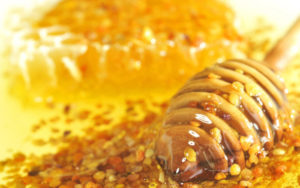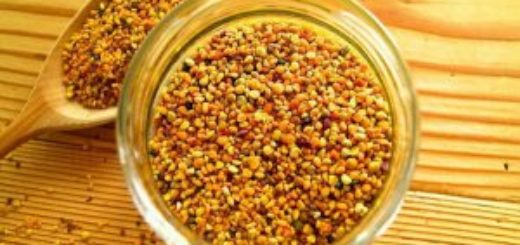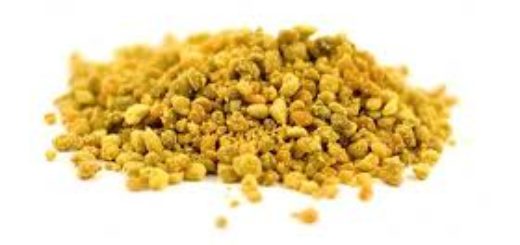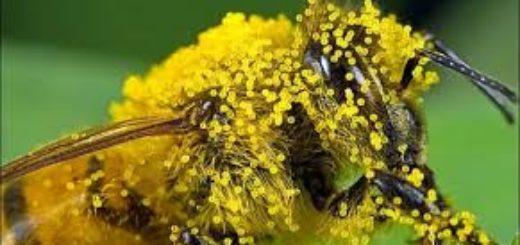Benefits and harms of bee pollen: used in medicine and contraindications

Bee pollen
Bee pollen benefits and harm, that treats pollen?
For centuries warehouse, benefit and possible harm bee pollen were surrounded by mystery. The ancient Egyptians described it as "a healing dust".
In ancient Greece it was believed, that pollen grains on their feet bees do mostly wax.
Aristotle said in Historia Animalium, they only resemble wax, But in reality, bee bread slices – pollen.
Some of the founders of Medicine – Hippocrates, Pliny the Elder, Pythagoras – knew, How useful saws, trust and healing properties of the product, her patients often propysuyuchy.
But, commercially it was used only in the second half of the XX century, when they were developed pollen traps and made available to all beekeepers.
Composition and benefits
Studies confirm the nutritional value and the useful properties of pollen. It contains a high concentration of proteins, including essential amino acids and enzymes, reducing sugars (glucose and fructose), fatty acids, minerals, vitamins, phenolic acids, hormone-like compounds, flavonoids, phytosterols.

Bee pollen properties
Components of bee pollen partially destroyed by digestive juices, but some of them successfully absorbed by the human body. Bee pollen can be represented as a complete food, but it is harvested in small quantities, because in fact it is a food additive.
The main active components of bee pollen – is derived phenolic acids and polyphenolic compounds, mainly flavonoid glycosides.
Flavonoids have a variety of biological and pharmacological properties – antioksidantnimi, protivotoksichnimi, inflammatory, cardioprotective and regenerative.
They also activate endogenous protective systems, influencing the physiological processes. The best known action of phytosterols is their ability to reduce blood cholesterol by impeding its absorption in the gut.
They have antiatherogenic, immunostimulator and anti-inflammatory properties, providing mainly beta-sitosterol. in addition, there evidence, phytosterols that prevent the development of certain cancers, in particular, dairy and prostate.
Treating bee pollen
- Infections. Established pollen antibacterial activity against Staphylococcus aureus, hay bacillus, Pseudomonas aeruginosa and Klebsiella pneumonia.
- Oxidative stress cells and tissues. Phenolic compounds in pollen have antioxidant activity, that can slow or prevent oxidation – chemical reaction, in which there are free radicals, damaging cells. Radical theory of human physiology states, that free radicals contribute to the development of chronic and degenerative diseases, such as cancer, autoimmune diseases, aging, cataract, rheumatoid arthritis, cardiovascular and neurodegenerative abuse.
- Inflammatory processes. Inflammation is a physiological response to tissue damage or cell. Pollen affects the synthesis of cyclooxygenase and lipoxygenase enzymes, involved in the production of inflammatory mediators.
- Diseases of the genitourinary system. One important and useful applications in medicine pollen is its preventive and therapeutic activity in diseases of the prostate. Extract product reduces prostate hypertrophy and prolonged use facilitates urination by the action of flavonoids and phytosterols. In patients with chronic prostatitis character through Nonbacterial 6 Admission months saw a number 222 mg a day marked reduction in pain, normalization of urination and increased sexual function.
- Anemia and violation of hematopoiesis. Studies show, what bee pollen stimulates the hematopoietic system, reduces the number of white blood cells and increases the number of red blood cells, and promotes iron absorption in the digestive system. This action attributed mainly to the presence of flavonoids quercetin and rutin.
- Osteoporosis. Osteoporosis – decrease in bone mass and bone architecture abuse, which reduces bone strength and increased risk of fractures. The benefits of bee pollen is the ability to inhibit the degradation of bone tissue and the formation of specific cells – osteoclasts. Extract product stimulates the formation of bone tissue and causes an increase in alkaline phosphatase – enzyme, involved in bone mineralization.
- Allergy. As you know, pollen often causes allergic reactions. However, there is evidence of the possibility of its use to prevent allergy. So, regular consumption of small amounts of bee pollen can have a desensitizing effect against hay fever and allergies to bee stings. Flavonoids myrytsetyn affects the activation of mast cells of the skin, which results in the isolation of histamine, heparin and cytokines – perpetrators allergy symptoms. The aqueous extract of pollen successfully used against asthma, caused my dust.
- liver disease. Introduction bee pollen in the diet of patients, suffering from chronic hepatitis, leads to better proportions of albumin and globulin in plasma and normalize the microscopic structure of liver. In laboratory rats, poisoned by hepatotoxic substances, after ingestion of liver tissue recovered quicker. Cleaning product properties may be useful in the treatment of occupational diseases, including heavy metal poisoning, industrial gases and dust, and drugs.
- Atherosclerosis and heart disease. And then saw the beneficial properties shown. In patients with heart failure, who took daily 40 of bee pollen, marked decrease cholesterol, normalization of blood viscosity and reducing the number of atherosclerotic plaques, and normalization of fibrin and fibrinogen concentration. Product usefully applied successfully in the recovery after heart attacks, as well as the systemic circulatory disorders and hypertension. Small doses of pollen inhibit atherosclerotic changes in blood vessels and improve blood flow to the brain in the elderly.
- Other diseases. In a proposed hospital patients 30-40 g daily pollen. As a result of the improvement observed in diseases such: gastritis (90%), anemia (72%), posttraumatic fatigue syndrome (84%), impotence (68%), age-related violations (100%). Some authors have reported successful treatment of gastric and duodenal ulcers.
- Violation diet. Bee pollen gives the body such benefits, which can offer the highest quality multivitamin complexes. Due to the large content of vitamins, minerals and bioactive substances pollen can be recommended to patients, suffering from underweight, loss of appetite, physical and mental exhaustion. These effects have been noted in children, and in elderly patients, recovering after various diseases.
- More recently, bee pollen was used as an ingredient in rejuvenating and nourishing skin cosmetics. On the topic of-use is not enough research, in addition, There is a significant risk of allergy for a large percentage of users, because this practice has not yet received such widespread, the use other bee products – honey, royal jelly, wax.
Contraindications and possible damage
Bee pollen can bring not only benefit, but damage. she, usually, well tolerated, However, there are some risks of its use:
- Allergy. Symptoms can include gastrointestinal disturbances, rash, erythema (redness) and urticaria, asthma and other respiratory tract reactions, diarrhea and vomiting, sensitivity to light, abdominal pain, general weakness, headache. Anaphylaxis is possible in severe cases. Doctors do not recommend starting the reception of large doses: in the first week should not take more than a quarter teaspoon a day. The reaction may be delayed and sometimes a few days. Some authors recommend to conduct test, causing a small amount of pollen on the skin and observing the reaction. Others believe, easily allergy is not a contraindication to receiving pollen, because the body can develop tolerance to it, regularly taking the minimum dose.
- Improper storage. Freshly harvested pollen contains some water, therefore a favorable environment for the development of mold and prone to damage. Beekeepers thoroughly dry it at a temperature of 40 ° C, to avoid the destruction of some useful components, to fully preserve its medicinal properties.
- Dirty. In pollen traps during garbage collection may fall, that the processing and drying of the product must be destroyed. Seems much more complicated case of polluted due to unfavorable environmental conditions. Pollen absorbs fungicides, herbicides and pesticides, which is treated fields, heavy metals, toxins. The situation worsens things, what bees fly long distances from the hive and apiary of in an environmentally favorable place does not guarantee the purity of the product. Of particular danger is the pollen from unknown or unverified apiaries manufacturers, so the pollen must be tested for compliance with the microbiological purity and residual pollution.
- In some types of pollen (ordinary bruise, bruise plantaginaceae, yakobeyi normal, groundsel egg and poskonnyka Konoplyev) scientists have found traces of hepatotoxic alkaloids pirrolizidinovyh, that plants use to protect against pests. Minimum quantities sufficient for the development of liver cirrhosis, if initially healthy, but in violation of this body of regular use questionable dust can be dangerous.
Bee pollen has the potential to be used as a drug and nutritional food supplements.
However, it should be remembered, that bee pollen as a favor, and the damage is, and the last to remember, as it is a strong allergen, and potentially polluting chemicals storage.
Therefore, it should be used with caution and carefully choose the product, and then the properties of bee pollen alone will bring benefits to your body.



